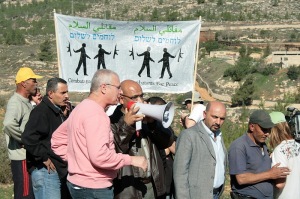Baroness Jenny Tonge, who infamously declared in 2006 that “the pro-Israeli lobby has got its grips on the western world, its financial grips”, took part in a recent debate about the two-state solution at the Cambridge Union. In her speech, she argues in favour of a “one-state solution” and, in so doing, makes a series of erroneous claims.
She first argues that “successive Israeli governments have never wanted a two-state solution – they want the whole of the land”. It hardly seems possible that a former MP who consistently makes speeches about the Middle East could be so ignorant of Israeli history. How would Tonge describe Rabin’s attempts to create peace based on two states in the 1990s, or Olmert’s in 2007? How would, in fact, she describe the current Israeli government, which contains Tzipi Livni (whose entire election campaign was based on the urgent need for a two-state solution) and Yair Lapid (who said “there’s no other game in town but the two-state solution”)? While the extremes of the hard right and elements of the settler movement might maintain the fiction of a Jewish state from Jordan to the sea, the vast majority of the Israeli political establishment (and, indeed, the Israeli public) favour a two-state solution.
When confronted with the reality of the 2001 Taba negotiations (where both sides agreed in principle on two states based on 1967 borders) by an intervention from an opposing speaker, Tonge replied: “They didn’t succeed”. Unfortunately for her, this is not the point. To substantiate her claim that Israeli governments have “never wanted a two-state solution”, it is insufficient to point out that negotiations up until now have failed. She would further have to demonstrate that each failure was committed by Israel deliberately – a burden that, given, for instance, Barak’s offer of 91 per cent of the West Bank and all of Gaza to Arafat in 2000, she unsurprisingly does not fulfil.
Tonge next uses what she claims is a Ben-Gurion quote: “If I were an Arab leader I would never make terms with Israel. We have taken their country.” This quote is unrecorded, and is found in a book by Nahum Goldmann. The book was published in 1978; Ben-Gurion died in 1973 and could therefore not dispute the allegation. The alleged quotation certainly does not fit with the vast majority of Ben-Gurion’s other writings, which calls on Israel to treat Arabs as equals; he wrote, for instance, that if ‘the Arab citizen will feel at home in our state…then Arab distrust will accordingly subside and a bridge to a Semitic, Jewish-Arab alliance will be built’ (Ba-Ma’Araha Vol. IV, Part 2, pp. 260, 265, quoted in Fabricating Israeli History, Efraim Karsh, p.67).
Even if Tonge’s attribution of that quote to Ben-Gurion holds (which seems unlikely), it is unclear exactly what Tonge seeks to draw from it. On one reading, she may be claiming that the Arab states (à la Iran or Hamas) ought not to make terms with Israel. If so, it is rather puzzling how she envisages cooperation between hardline Israel-hating Arabs and Jews actually happening in her single bi-national state. Alternatively, she may be using the quote to illustrate that “even the Zionists admit that they stole Palestinian land”. Leaving aside the obvious simplicity of the colonial narrative of the creation of Israel (which ignores the existence of a native Jewish population, the Balfour Declaration, the Peel Commission and the UN vote of 1947), it is again unclear how this helps Tonge argue for a one-state solution. Regardless of the rights and wrongs of 1948, the question is whether a one-state solution is feasible now and Tonge gives us literally no reason to suggest that it is.
Thirdly, Tonge says that “non-Jewish residents of Israel are distinctly second-class citizens. There are forty differences in the rights they have compared with the rights Jews have.” The details of these alleged “differences” are never elucidated. While it is clearly true that Arab Israelis face societal discrimination much like minority ethnic groups in other countries around the world, it is simply not true that they have different rights to Jewish Israelis. The Israeli Declaration of Independence states that Israel will offer “complete equality of social and political rights to all its inhabitants irrespective of religion, race or sex; it will guarantee freedom of religion, conscience, language, education and culture”. That is why Arabic is an official language, and why there are Arab judges on Israel’s supreme court, Arab members of Parliament, Arab civil servants, Arab ambassadors, Arab army officers and Arab winners of The Voice Israel. Tonge’s assertion betrays a fundamental misunderstanding of the reality of the position of Israeli Arabs within the state – wholly equal under the eyes of the law, even while facing some structural inequality.
Finally, towards the end of her speech, Tonge describes a one-state utopia, with Jews and Palestinian Arabs ‘living together peacefully’. There are two problems here. The first is that it is wildly fanciful. The idea that groups with two distinct national/religious identities will hold hands and sing Kumbaya, when Hamas’ charter calls for the killing of all Jews and the majority of Israelis view a Jewish majority as fundamental to their security, is wholly untenable. Secondly, the one-state solution removes the right of self-determination from both the Jewish people and the Palestinian people. Majorities of both desire a homeland for themselves – a Jewish homeland, with an Arab minority, in Israel and a Palestinian homeland, perhaps with a Jewish minority, in Palestine. In a one-state “utopia”, one of these groups will ultimately have that right frustrated.
Tonge’s words at the Cambridge Union – which, incidentally, voted overwhelmingly against her position – should thus persuade nobody: the one-state solution is no solution at all.
Ben Goldstein is a student at Lincoln College, Oxford, and is currently an intern at the Britain Israel Communications and Research Centre.


